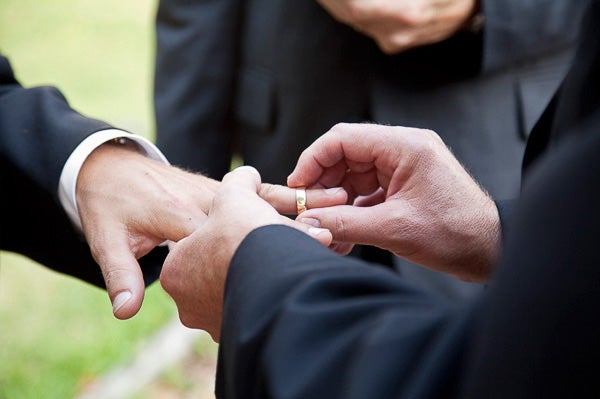|
March 26, 2013
Q&A: Stanford Law Professor Jane Schacter on the Supreme Court same-sex marriage hearings
Same-sex marriage takes center stage at the U.S. Supreme Court this week. Stanford Law Professor Jane Schacter talks about the arguments. By Brooke Donald

This week the U.S. Supreme Court considers California's ban on same-sex marriage and, in a separate case, the federal Defense of Marriage Act. (Photo: Lisa F. Young / iStock)
The U.S. Supreme Court is hearing arguments this week on same-sex marriage. On Tuesday, the justices questioned lawyers on California's Proposition 8, the voter approved initiative that bans the unions.
On Wednesday, the federal Defense of Marriage Act (DOMA) will be debated.
Stanford Law Professor Jane Schacter, a leading expert on sexual orientation law, offers her analysis of the hearings on Proposition 8 and previews what's to come on Wednesday.
Is there any indication of how the court will rule?
My strong sense walking away from it is it's quite likely that they don't reach the merits in this case, meaning they don't get to whether Prop. 8 is unconstitutional.
There were issues raised in this case about standing, and whether those who supported the ballot measure actually have standing to appeal. That was an issue that was widely anticipated, heavily briefed, and that was the subject of wide discussion.
Any surprises?
The thing that I didn't expect was that Justice Kennedy raised the possibility … that they shouldn't have granted review. Justice Sotomayor chimed in at the end expressing some sympathy for that position. So with that, they're not getting to the constitutional issue.
But the justices were the ones to decide to take the case. Is it common that they decide later that they shouldn't have?
They do it. I wouldn't say it's a regular thing but they did it on the last day of the term last year. They do it when they discover through briefing and argument that the case is not as good a vehicle as they originally thought it was for deciding the issue.
What about the argument that this issue is still too new? Proponents of the ban cautioned the court to not stop public debate.
Justice Ginsburg has made the argument that the court got involved too soon [in abortion with the Roe v. Wade decision]. It ends up politicizing it more. It ends up throwing this whole judicial activist argument into it and that polarizes people.
I think a lot of people thought they were going to grant review in the DOMA case and deny review in the Prop. 8 case, and at the end of the day that may yet end up being what happens. They decide DOMA and they use some procedural escape hatch to get out of Prop. 8.
Justice Kennedy is often seen as the swing vote. Did he show where he stands today?
He articulated, on the one hand, substantive concern about Prop. 8. He talked very early on about the effect on some 37,000 children who are being raised by same-sex parents. What does it mean for those children for the state to say their families are not equal? He seemed very concerned about that but he seemed equally concerned about getting involved too soon. These various other options seemed problematic to him. So the negative inference that I'm drawing is that if he's the decisive vote we should pay attention to him looking around for a vehicle to dismiss the case.
Does Wednesday's hearing give any clues to what we should expect from the DOMA argument?
My takeaway from today is that they're more likely to avoid the merits than we might have thought. That it's going to be a standing ruling, that it's going to be dismissed, that it's going to be remanded. That's my feeling, again subject to the enormous caution that we overread oral argument.
Tomorrow, we're going to see whether they're equally interested in getting rid of the DOMA case. I think that's a different kettle of fish. We've got this federal statute and it's on the books and it has implications across a thousand different statutory programs and we need an answer from the Supreme Court about what the government's supposed to do.
We will see if they're singing from the same songbook tomorrow looking for an escape hatch.
-30-
|